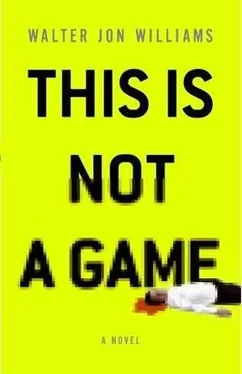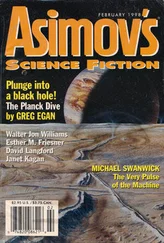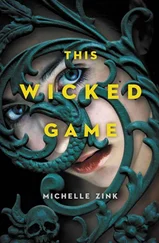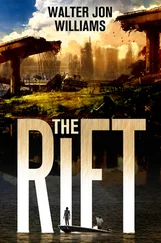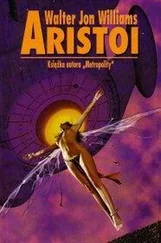She couldn’t stop herself from peering out the window blinds of the conference room, to make sure that Joe Clever wasn’t lurking somewhere with his Big Ears. No eavesdroppers were visible. She turned on the white-noise generators anyway, and the meeting proceeded with a kind of distant waterfall hiss in the background.
When Helmuth entered, Dagmar introduced BJ.
“Helmuth von Moltke,” Helmuth said, offering his hand.
BJ raised his eyebrows. “Von Moltke? ” he asked.
“Programmer by day,” said Helmuth. “Eurotrash by night.”
Helmuth, descended from a German general, was a sleek, handsome young man, still under thirty. He wore cashmere slacks, a T-shirt with the Ferrari stallion, and a jacket of paper-thin, featherlight leather made in Buenos Aires. He was known to spend most of his nights partying on the Sunset Strip. When or if he slept was unknown.
Jack Stone ambled in next. He was the puzzle designer and a Type Two Geek, which was basically a Type One plus about eighty pounds. He lived, ate, and breathed puzzles, at least when he wasn’t living, eating, and breathing Frito pies, which he made himself by lining a bowl with Fritos, pouring Wolf brand chili on top, and putting the result in the microwave. When it was hot, he’d throw grated jack cheese on top. Even other Type Twos couldn’t abide the result.
Fortunately he hadn’t brought a Frito pie with him this time. Instead he had a plastic sack filled with miniature candy bars, which he would eat like popcorn.
Dagmar introduced BJ as “Boris, who’s going to help with the writing.” The others paid no attention to BJ after that. Writing wasn’t interesting to them.
When everyone arrived, Dagmar demonstrated one of the Tapping the Source units and explained Charlie’s latest nonnegotiable demands.
“You’re changing the story after the launch? ” demanded Helmuth.
“No point in whining,” Dagmar said. “I’ve already whined to Charlie, and Charlie isn’t listening.”
So of course they whined some more. Dagmar let them.
“We have the budget on this one,” Dagmar said. “If you need help, we’ll hire anyone who can provide it. Freelance programmers, design studios, you name it. Start calling them now, if you think you’ll need them down the line.”
“The players are going to hate this!” Jack protested. “They went nuts when they had to buy that ninjaware. They’re going to be even more crazed when they have to buy these damn water-quality units.”
“I’ve got a work-around,” Dagmar said, and smiled. “We buy the units for them.”
They looked at her. She shrugged.
“Maybe not for all of them,” she conceded, “but the budget will buy a lot of forty-dollar boxes.”
After that, it went a little easier.
After the meeting, Dagmar and BJ went to her office to replot Briana Hall. The scent of Siyed’s roses saturated the air. Drinking coffee and eating Pop-Tarts from the snack station, they worked over Dagmar’s interactive monitors and saw their changes appear instantly on the big wall plasma screen, complete with colored arrows that showed how the complex plot elements were connected.
BJ was as devious a story craftsman as Dagmar remembered from their college days. He had an instinctive gift for the twist, the reveal, the snapper that would whip the story in an unanticipated direction, like a rocket slinging around the moon en route to some distant world.
“Right,” Dagmar said finally. “Let me put you to work writing the various documents relating to the backstory. I’ll do the audio, video, and comic scripts, because I’m familiar with the format.”
BJ shrugged. “That should work.”
This meant that BJ would be spending his days creating the text for phony documents, everything from school reports to classified government intelligence assessments, newspaper articles to blog entries, birth certificates to death certificates. The Graphics Department would then turn the text into facsimiles of the actual documents. An ARG thrived on its virtual paper trail-puzzles led to documents, documents contained more puzzles, the puzzles led to more documents, the documents led to revelations.
“You might as well work from home,” Dagmar told him. “We don’t have an office for you here.”
“And besides,” BJ said, “I might run into Charlie in the elevator.”
“Like I care? ” Dagmar snarled. And then wondered if she actually meant what she’d just said.
Dagmar looked out her office window and was surprised to discover it was night. She looked at the time on her monitor screen and saw it was after nine o’clock.
She realized she was very hungry. The coffee shop in the atrium closed at nine, so there was no food in the building unless she wanted something from a vending machine, or more Pop-Tarts. At this hour, neither option seemed attractive.
“Want to get dinner? ” she asked. “Charlie’s paying.”
BJ grinned. “That’s an offer I can’t refuse.”
They found a steak house open on Ventura, one with dim lighting in 1950s colored-glass sconces, battered dark wood tables, and red-and-white-checked tablecloths. Dagmar ordered a margarita and a medium-rare rib eye. She didn’t eat much red meat, but on this evening she planned on making a sizzling, juicy exception.
“Well,” BJ said, “as long as Charlie’s paying.” He ordered the same thing, only with a shrimp cocktail for an appetizer and king crab legs draped over his steak.
“At this rate,” Dagmar said, “it won’t be long before you bring Charlie to his knees.”
“I wish,” BJ muttered.
Dagmar looked at him. “What would it take,” she said, “for you and Charlie to be friends again? ”
“Well,” said BJ, “he could give my half of the company back.”
“He doesn’t actually own the company,” Dagmar said. “It’s his investors.”
BJ raised an eyebrow. “You ever met one of these investors? Seen one? Heard their names? ”
“No,” Dagmar said. “But then I’m not involved with Charlie on that level.”
“I don’t think anyone is,” BJ said. “I think there’s a reason no one’s ever seen the people who rescued the company.”
Dagmar felt suspicion sing in her bones, a deep, subdural hum of mistrust. The day’s anger and the complex logistics and plotting session had kept a lid on her speculations, but now her doubts flooded her.
“Any idea,” she asked, “why Charlie’s angels are so mysterious?”
“Nope.” He scratched one of his muttonchops. “My best guess is that they’re involved in some kind of tax-fraud scheme. Or maybe the investors are laundering money through AvN Soft.”
Dagmar leaned toward BJ over the table.
“How would that work, exactly? ” she said.
“If they’re laundering money, they’d just overpay for AvN’s services. How are the IRS auditors going to know how much our autonomous agents are worth? As long as Charlie pays taxes on the money that’s rolling in, the IRS and everyone else are happy.”
Dagmar nodded. That seemed plausible enough. And she hadn’t failed to notice that “our.”
The margaritas and the shrimp cocktail arrived. The prawns were vast and pink, like tongues lolling from the rim of a cocktail glass. BJ offered Dagmar one, and she took it. It had that bland, farmed taste that suggested it had never been anywhere near an ocean, but even so, it whetted Dagmar’s appetite.
BJ gave her a calculating look.
“You’re thinking about that Russian assassin, aren’t you?” he said. “You think Charlie’s involved with the Maffya.”
“The assassin,” said Dagmar, “is a problem to which I have no ready answer.”
“So you’re trying to track the killer through the game.” Thoughtfully, BJ picked up a shrimp, then replaced it on the rim of the cocktail glass. “And you have to hope that he’ll have some answers once he’s picked up. I have to give you credit for optimism.”
Читать дальше
